
On September 12th, the grand unveiling ceremony for the "Textile Machinery Intelligent Training Base," jointly established by Quanzhou Bushuo Machinery Co., Ltd. and Quanzhou Normal University, was held. This marked a substantial step forward in the university-enterprise cooperation and will jointly promote the deep integration of textile intelligent manufacturing talent cultivation and industry.
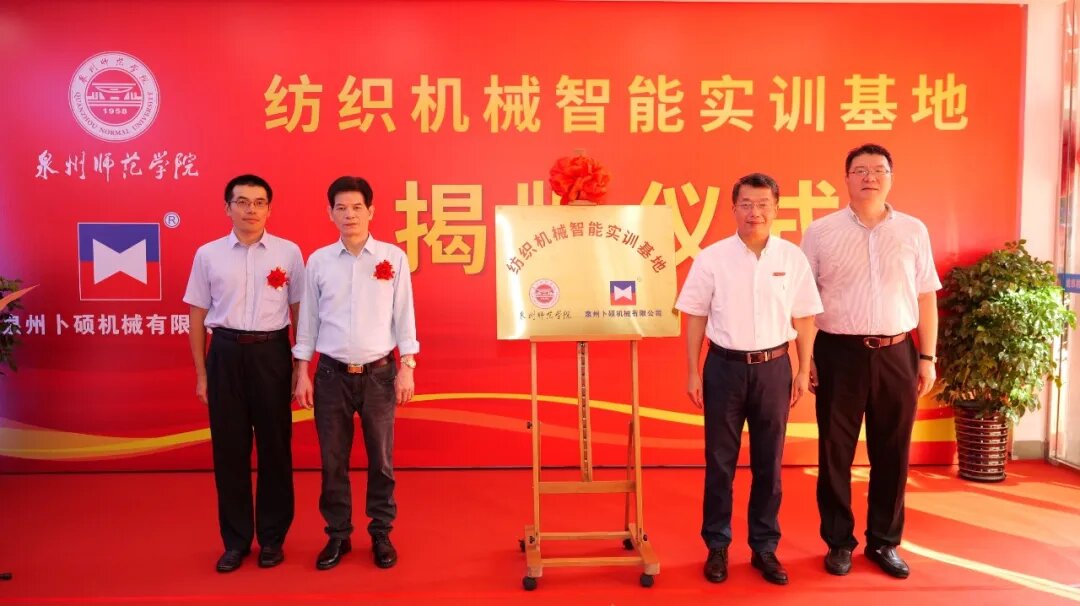
Cong Zheng, Secretary-General of the China Textile Machinery Association (first from left), Huang Lizhen, Chairman of Quanzhou Bushuo Machinery Co., Ltd. (second from left), Ke Ruiqing, Party Secretary of Quanzhou Normal University (second from right), and Xiahou Jianbing, Vice President of Quanzhou Normal University (first from right), jointly unveiled the "Textile Machinery Intelligent Training Base."
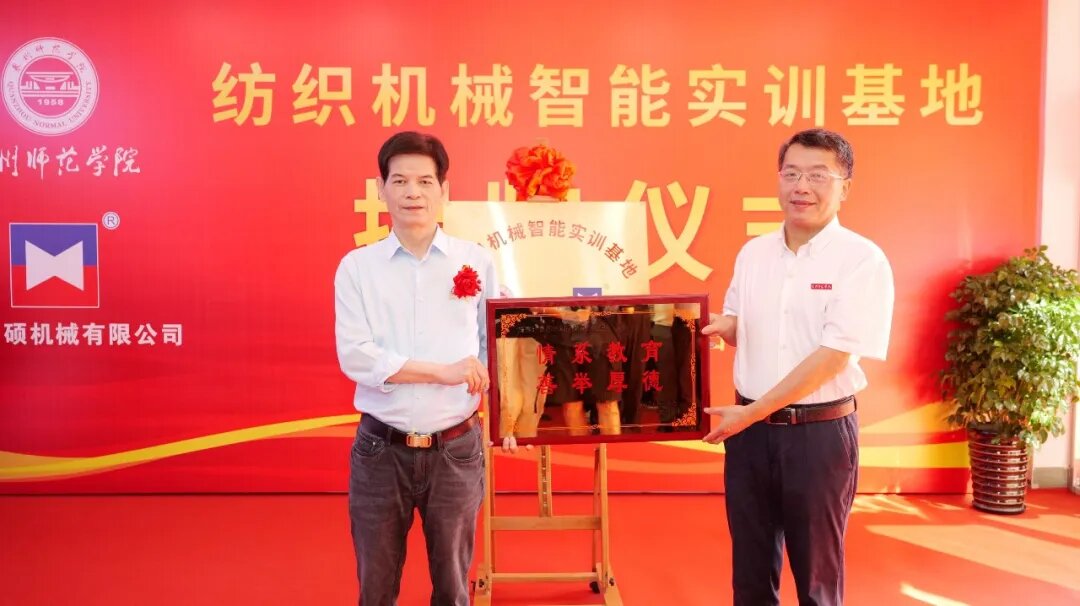
Ke Ruiqing (right) presented Bushuo Machinery with a plaque that read "Devotion to Education, Benevolence, and Virtue."
The base was donated by Huang Lizhen, Chairman of Bushuo Machinery, and co-founded with seven industry chain companies, including Fujian Yongliang Machinery Technology Co., Ltd., Zhejiang Taiyangzhou Electrical Technology Co., Ltd., Groz-Beckert, Quanzhou Luojiang Yongtai Machinery Co., Ltd., Xiamen Yufulong Hardware Co., Ltd., Xiamen Hangsheng Machinery Co., Ltd., and Fujian Kaiquan Electrical Co., Ltd. It aims to create a comprehensive platform integrating training, exhibitions, and exchanges, promoting technological advancement and talent development in the weft knitting machinery industry and injecting new momentum into the industry's innovative development.
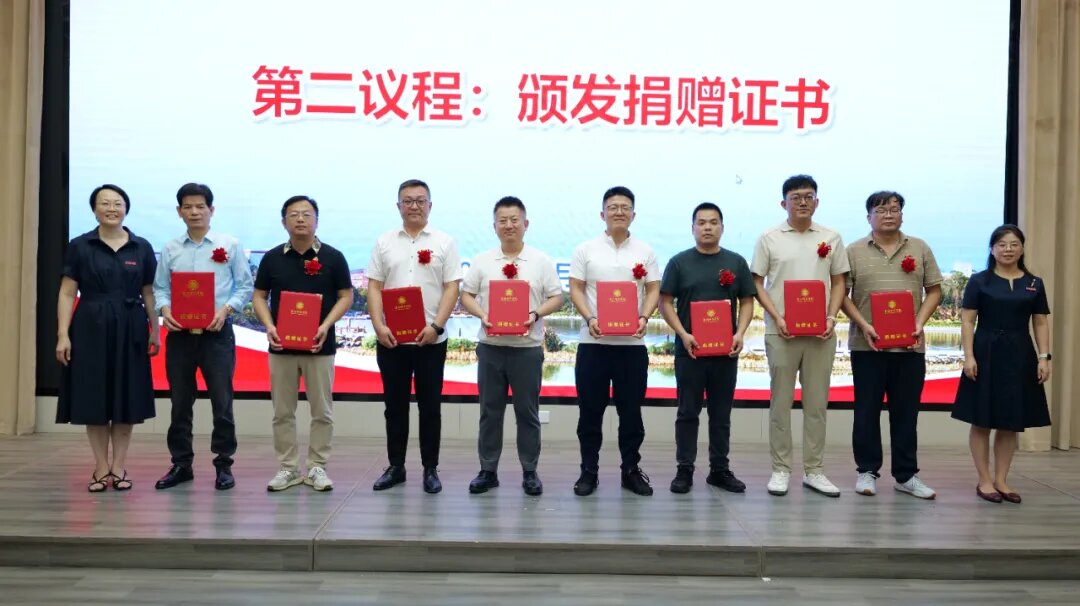
Wu Lishuang (first left), Head of the School of Physics and Information Engineering, and Cui Lina (first right), Head of the School of Textiles and Clothing, of Quanzhou Normal University, presented donation certificates to the founding companies of the "Textile Machinery Intelligent Training Base."
Building a platform to create a new paradigm for school-enterprise collaboration
Cong Zheng, Secretary-General of the China Textile Machinery Association, stated that Bushuo Machinery, as the first chairperson of the two-term China Textile Machinery Association's Circular Knitting Machine Industry Branch, has done a great deal of pioneering work for the circular knitting machine industry. As early as 2022, when considering the issue of talent cultivation in the industry, Chairman Huang proposed holding an "Advanced Training Course for Compound Talent Cultivation in the Circular Knitting Machine Industry." To date, this course has been held for four sessions, cultivating numerous talents for the industry and receiving positive industry feedback. Secondly, with the support of Bushuo Machinery, the construction of this base has received active participation from upstream and downstream companies in the industry chain. This collective effort will enable the training base to pool more resources and expertise. Thirdly, Quanzhou is a global hub for large circular knitting machine production, and Quanzhou Normal University enjoys a strategic location. We hope that the training base will continue to flourish through continued and in-depth collaboration between the university and the enterprise.
Huang Lizhen, Chairman of Quanzhou Bushuo Machinery, stated that Quanzhou Normal University is a prestigious institution with a rich history. With the active attention and support of relevant university departments and leadership, the establishment of the textile machinery intelligent training base, spearheaded by Bushuo Machinery and partnering with leading companies in the industry chain, is a highly anticipated initiative. Quanzhou boasts over a hundred weft knitting machinery companies, representing significant industry influence and market potential. The collaboration between Bushuo Machinery and the university will continue to deepen in the future to further meet the industry's talent needs and contribute to its technological advancement and sustainable development.
Xiahou Jianbing, Vice President of Quanzhou Normal University, stated that weft knitting technology is currently developing towards intelligent, efficient, and green development. Quanzhou boasts 13,000 textile and footwear companies, forming an industrial cluster with an annual output value exceeding 700 billion yuan, accounting for 10% of the national textile and apparel output. The establishment of the Textile Machinery Intelligent Training Base is a significant initiative by the university to promote the deep integration of textile technology and intelligent manufacturing. It also serves as a key platform for cultivating new-quality productivity and enabling industrial transformation and upgrading. It is hoped that both the university and the university will leverage the base to further expand the depth and breadth of industry-university-research collaboration, jointly build a diversified and multi-level collaborative education system, innovate a "new engineering plus" talent development model, and create a high-level practice base integrating teaching and training, technological research and development, and the application of research results, injecting new impetus into the innovation and upgrading of the textile industry in Quanzhou and even Fujian Province.
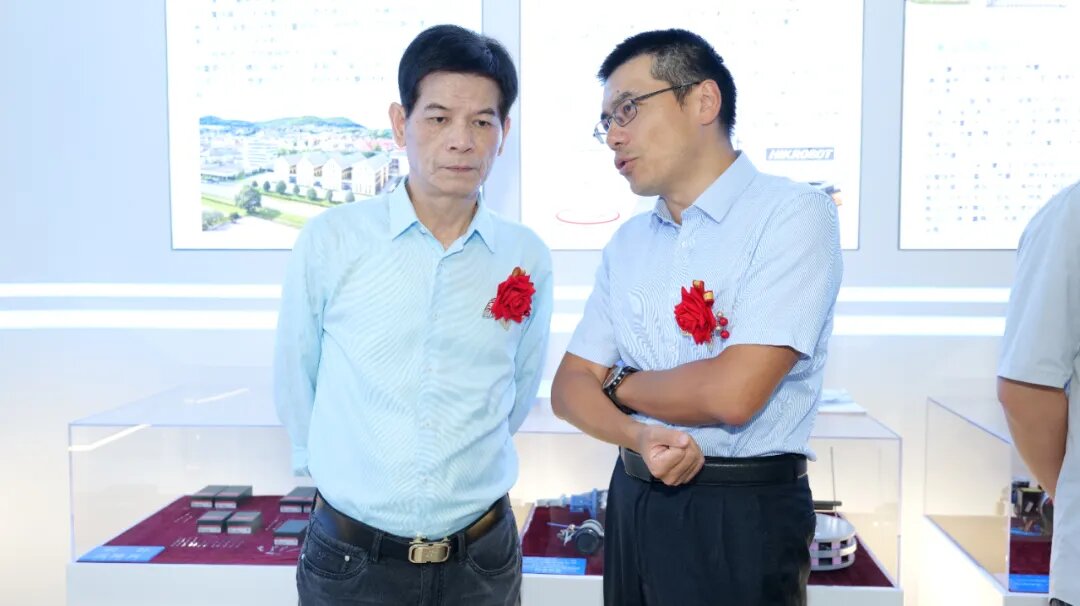
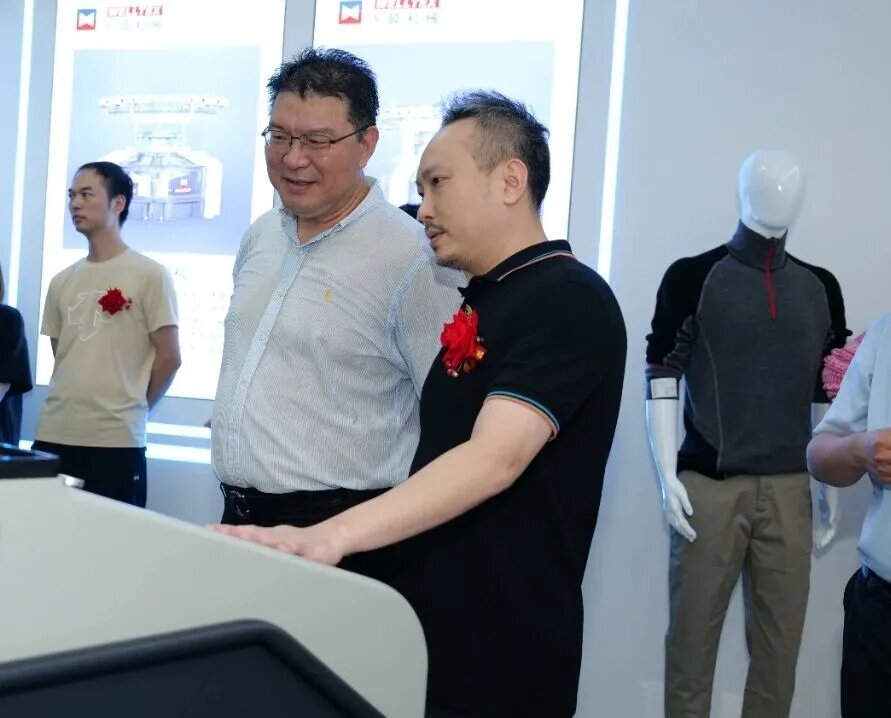
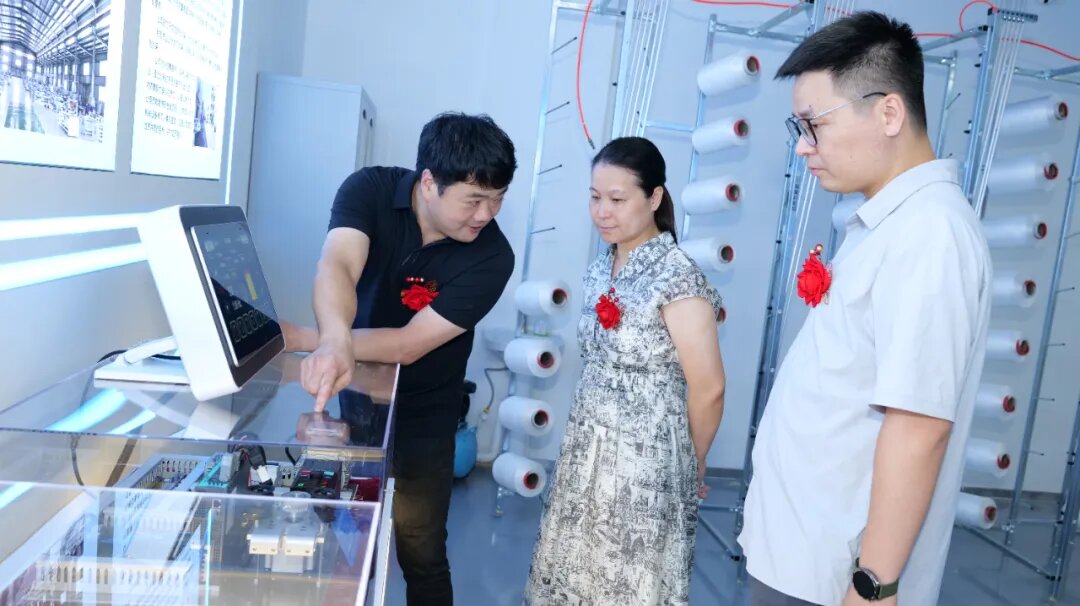
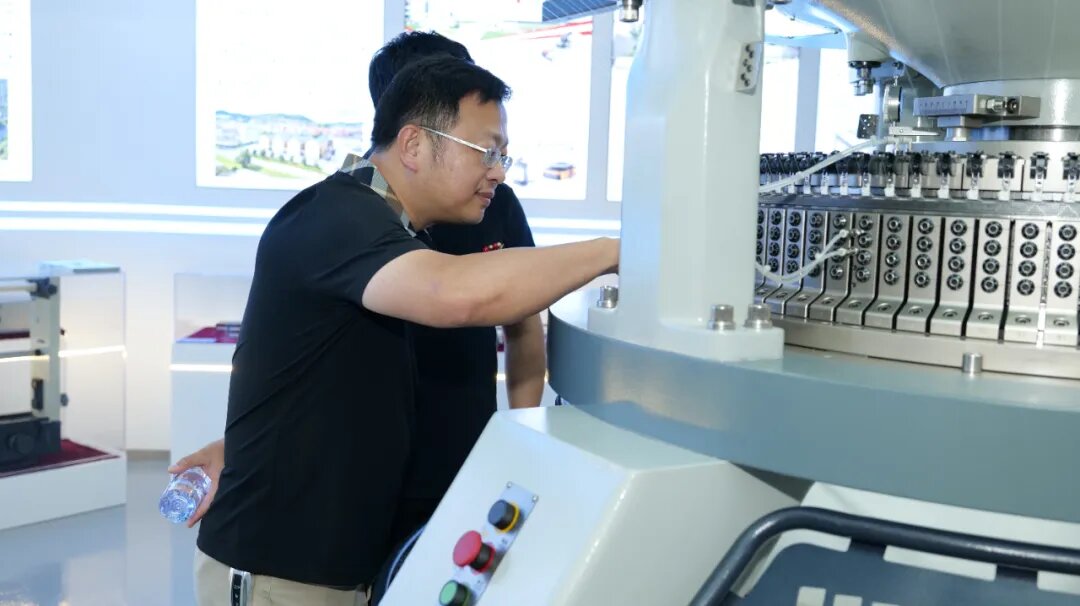
Delegates attending the event toured the exhibition hall of the Intelligent Training Base for Textile Machinery.
Mobilizing Resources to Build a Talent Pool
As the leading organization in the construction of the Intelligent Training Base for Textile Machinery, Bushuo Machinery has invested substantial resources and effort in this school-enterprise partnership. Huang Lizhen explained that the efficient implementation of the collaboration with Quanzhou Normal University was the result of careful selection and consideration. The company has fully mobilized the resources of Bushuo and seven leading companies in the industry chain to provide students at the training base with technical samples and learning materials that are aligned with current market trends. The goal is to help cultivate technical talent in the circular knitting machine industry who are both knowledgeable in theory and skilled in practical application.
Huang Lizhen noted that Bushuo Machinery's decision to collaborate with universities stems from a deep understanding of the industry's future. The transformation to intelligent manufacturing urgently requires interdisciplinary talent who are both knowledgeable in theory and proficient in technology, and such talent is in short supply in the market. The joint construction of the base represents a strategic investment by the company to proactively engage in talent development and build its own "talent pool." The biggest challenge facing the current industry's intelligent transformation is the talent gap, particularly the severe shortage of technical personnel with interdisciplinary knowledge and the ability to operate and maintain intelligent production lines. The establishment of this training base explores a new paradigm for talent development not only for the company itself but also for the entire industry.
"We hope to collaborate with universities to promote the popularization of industry technical standards and the application of innovative technologies, injecting new momentum into the industry's high-quality development." Huang Lizhen hopes the actual base will be located not only in the exhibition hall of Quanzhou Normal University, but also in the workshops of the eight participating companies.
Huang Wendong, General Manager of Bushuo Machinery, stated that the company's current technical staff is mostly over 40 years old. Without a continuous influx of relevant talent in the next 10-15 years, the talent gap will become even more severe. Finding and exploring new models for industrial talent development is imperative. For example, some outstanding international companies have established their own schools, fostering a technical talent pipeline through mentoring by experienced professionals, which has driven the sustainable development of these century-old companies. The unveiling of this training base is the first step in a long march toward talent development. To truly ensure the smooth operation of the base and maximize its potential, continued joint efforts from all parties are required.
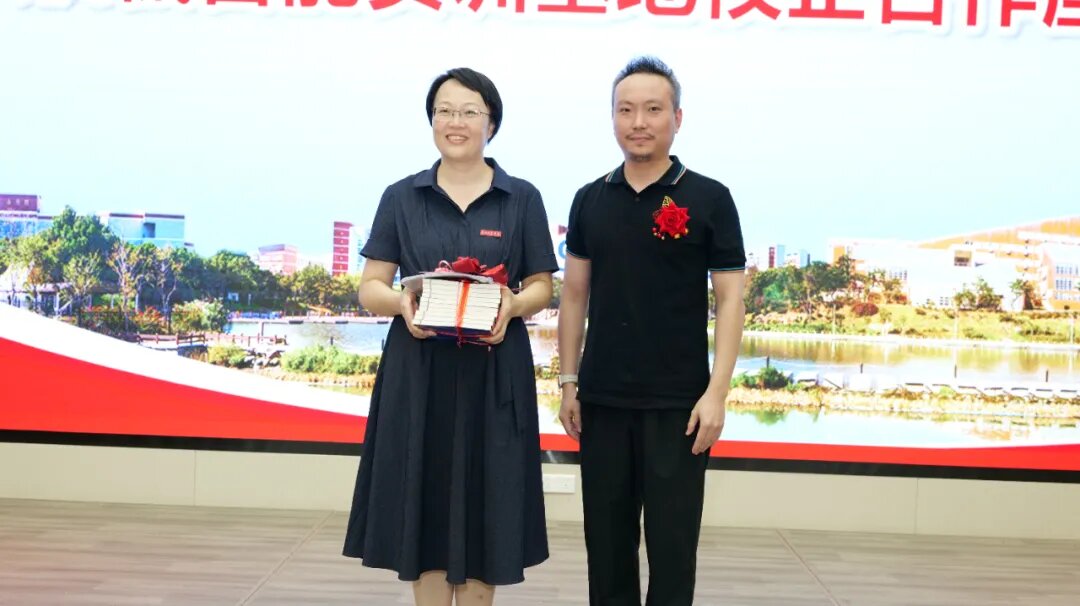
Huang Wendong (right) donated the "Circular Knitting Machine Industry Practical Manual" and related industry standards to Quanzhou Normal University.
Of particular note, to ensure the practical and detailed implementation of school-enterprise cooperation, Bushuo Machinery also donated the "Circular Knitting Machine Industry Practical Manual," recently published in September of this year, to Quanzhou Normal University. This manual, co-authored by leading industry and academic experts and frontline technical experts from leading domestic companies, covers a comprehensive knowledge system, encompassing the theoretical foundations of weft knitting, the structure and operating principles of circular knitting machines, fabric structure analysis and design, assembly processes, debugging techniques, yarn feeding and winding applications, production problem solutions, and intelligent manufacturing case studies. Bushuo Machinery spearheaded the development of this manual, in collaboration with the executive chairman of the Circular Knitting Machine Branch.
Multi-stakeholder collaboration ensures the implementation of industry-education integration.
Among the materials presented at the school-enterprise cooperation symposium, there was a document titled "Quanzhou Normal University's Training Program for the Textile Machinery and Intelligent Manufacturing Micro-major." This will serve as a blueprint for future talent development in the university's textile machinery program and also serve as a practical solution for the expansion of the Textile Machinery Intelligent Training Base.
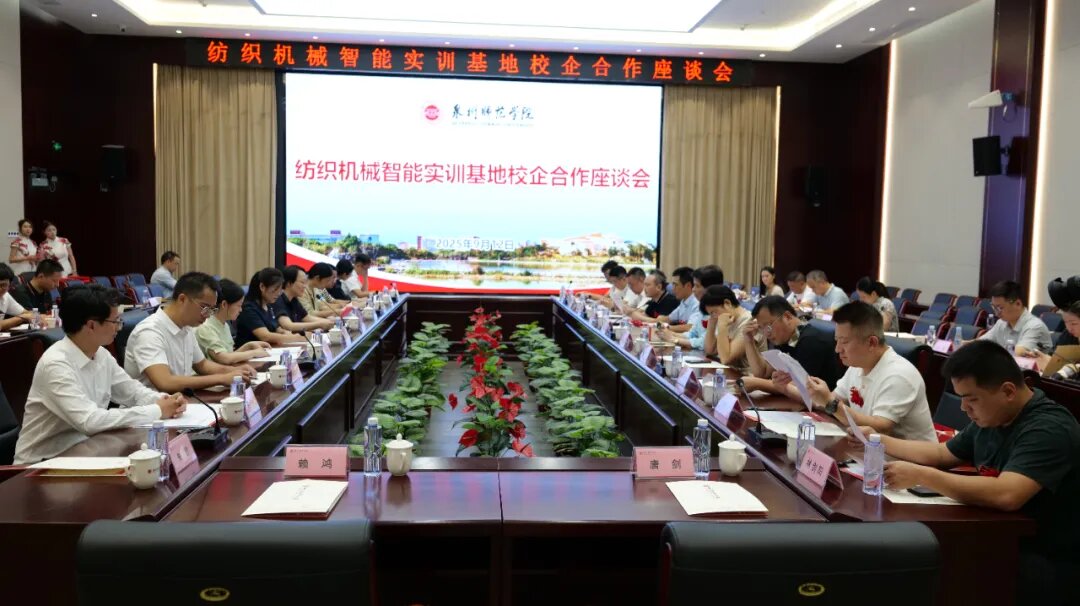
"Quanzhou Normal University is actively promoting the development of 'micro-majors' to cultivate applied and interdisciplinary talent. We are exploring an 'order-based' talent development path to achieve 'employment upon graduation and immediate on-the-job experience,' addressing students' employment challenges, filling talent gaps within enterprises, and strengthening our ability to serve the industry." Yao Guangping, a teacher from the School of Physics and Information Engineering at Quanzhou Normal University and a key participant in this school-enterprise cooperation project, expressed a deep understanding of industry-education integration.
Indeed, Quanzhou Normal University's choice to collaborate with Bushuo Machinery is based on a shared strategic vision. The establishment of the Textile Machinery Intelligent Training Base will effectively address the disconnect between theory and practice in traditional teaching, providing students with a cutting-edge, authentic industrial practice environment. This will significantly enhance their engineering practical skills, innovation capabilities, and ability to solve complex problems, cultivating "field engineers" that meet industry needs. Regarding disciplinary development, the base will also serve as a testing ground for faculty research projects, fostering interdisciplinary integration and promoting the optimization and upgrading of relevant curriculum systems.
The soon-to-be-completed training program also excited the entrepreneurs at the symposium.
"I'm already envisioning how this batch of students will be employed upon graduation," said Li Abian, General Manager of Fujian Yongliang Machinery Technology Co., Ltd., after reviewing the Quanzhou Normal University Textile Machinery and Intelligent Manufacturing Micro-major Training Program. Having witnessed the growth of the circular knitting machine industry over many years, he has consistently sought relevant paths to achieve breakthroughs in both thinking and technology, and he deeply understands the importance of personnel quality. Yongliang Technology is currently actively pursuing automation and intelligent transformation of its production lines, and faces a talent shortage. He stated that the establishment of this training base is the result of a strong rapport between the enterprise and the university, a meaningful endeavor whose final results are worth anticipating.
Gao Feng, General Manager of Zhejiang Taiyangzhou Electrical Technology Co., Ltd., stated that the Normal University's Textile Machinery and Intelligent Manufacturing Micro-major training program, which cultivates students' ability to solve core problems in intelligent equipment R&D, smart factory operations and maintenance, and industrial technology upgrades, is highly aligned with the textile industry's talent application requirements, and that Taiyangzhou is willing to actively cooperate with the base's talent development.
Wen Zhicai, General Manager of Groz-Beckert Trading (Shenzhen) Co., Ltd., expressed his willingness to provide students with the best knitting training, instilling the philosophy of continuous improvement and better products into the minds of the new generation of industry professionals.
Wu Wenfeng, Design Director of Quanzhou Luojiang Yongtai Machinery Co., Ltd., stated that the micro-major training program, including courses like mechanical transmission system dynamics analysis and mechanism design and the use of CAD tools, combines both theoretical and practical aspects. He expressed his hope that students will cherish the learning opportunity and put their knowledge into practice in the future.
Zhou Zhenger, Production Manager of Jingmei Machinery, stated that with the industry's iterative upgrades, previous technical knowledge is no longer sufficient to meet the needs of business development. Currently, companies urgently need professional technical personnel. Seeing the successful collaboration between Bushuo Machinery and Quanzhou Normal University has given them greater confidence in the development of industry talent.
You Zhulin, General Manager of Xiamen Yufulong Hardware Co., Ltd., and Lin Jianyang, Deputy General Manager of Xiamen Hangsheng Machinery Co., Ltd., also expressed their strong support and anticipation for this university-enterprise partnership.
Shao Hong, Director of the Third Industry Department of the China Textile Machinery Association, offered two suggestions regarding the development of micro-majors based on his own learning and work experience. First, the definition of textiles in the plan should be expanded. Today, textiles are no longer limited to clothing and home textiles, but are now widely used in aerospace, healthcare, and other industrial sectors to stimulate student interest. Second, the relevant courses can be further refined based on the talent demand for circular knitting machines.
Cong Zheng stated that the global manufacturing landscape is constantly changing, and continuous talent training is essential to maintain growth momentum. While many new forces have emerged in the circular knitting machine industry, the industry's continued high-quality development requires a steady stream of fresh blood, and integrating industry with education is a promising path. He hopes that the training base's courses will receive guidance from frontline entrepreneurs and experts, allowing for continuous adjustments and improvements. The China Textile Machinery Association is willing to work together to deepen and continuously support school-enterprise cooperation.
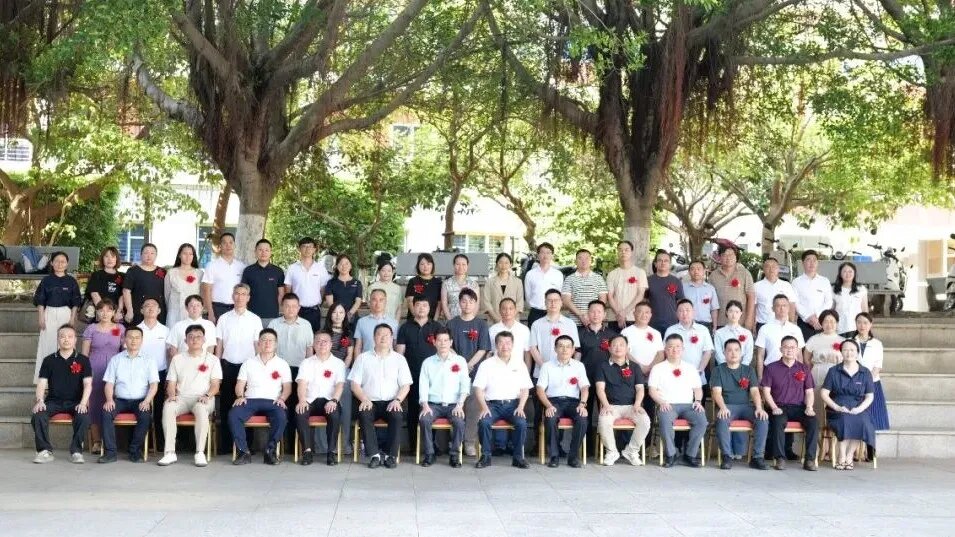
"Bringing together leading companies in the circular knitting machine segment to support talent development and educational development is a strategic industry strategy and a driving force for entrepreneurs to fulfill their social responsibilities and contribute to the industry. From the founding of the Charity Enterprise Helping Group over the past four years, to the various public welfare initiatives that have gone into establishing seven autism community shelters, to the completion of the training base today, this is another example of the concerted efforts of industry leader Huang Lizhen and Bu Shuo Machinery. Planting seeds of hope today will surely yield flourishing branches and leaves tomorrow." These words from Tong Shuangyan, Director of the Youth Development Fund Management Committee of the Fujian Shangmeng Public Welfare Foundation, give us even more confidence and hope.
We believe that with this unveiling ceremony as an opportunity, Quanzhou's textile intelligent manufacturing talent development will enter a new phase. This innovative model of industry-education integration and school-enterprise collaboration not only provides a practical platform for talent cultivation, but also establishes a long-term mechanism for the deep integration of industry, academia, research, and application. Looking ahead, with the solid implementation of the training base and micro-major program, we will continue to supply high-quality talent to the industry, supporting the intelligent transformation and upgrading of enterprises.